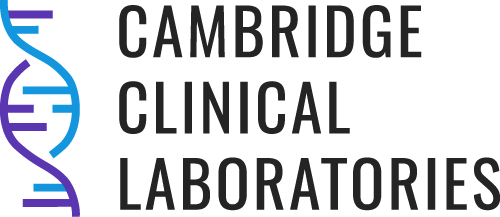Oncology
Cambridge Clinical Laboratories offers a range of oncology services across different disease types. We continue to expand our service offering, which now includes Next Generation Sequencing and staining technologies for companion diagnostics. Below is an overview of the tests we offer.
For more detail on screening and early cancer detection, please visit our Cancer Testing page.
For more detail on tests to investigate cancer aggressiveness or to guide treatment, please visit the Companion Diagnostics page.
Prostate Cancer
Prostate-Specific Antigen (PSA) – standard screening test
A protein produced by ‘normal’, as well as malignant, cells of the prostate gland. The PSA test measures the level of PSA in a man's blood. Elevated PSA levels may be indicative of a prostate issue requiring further investigation.
Stockholm3 - advanced screening test
A simple blood test to screen for risk of aggressive prostate cancer, which can be performed on men with PSA as low as 1.5 ng/mL who would not otherwise be detected. It analyses protein markers and genetic information alongside clinical data, giving a risk score and clear directions for further investigation (hisk risk) or to retest in the future (low risk).
Proclarix - screening and/or alongside MRI
A simple protein-based blood test that can be done with the same sample as the PSA test. No additional intervention is required with results becoming quickly available. Patients with a PSA level between 2 and 10 ng/ml are in a diagnostic grey zone. Proclarix helps doctors and patients with PSA levels in the grey zone. Its Proclarix Risk Score delivers clear and immediate diagnostic support for further treatment decisions.
Prostatype®'s unique system identifies the genetic fingerprint of cancer by measuring information from cancer stem cell genes. The gene expressions together with other clinical parameters such as PSA, Gleason and Tumour stage are entered into the Classification of Prostatic Malignancy Algorithm (CPMA) software that is linked to a unique patient data base. The software calculates a P-score which provides a measure of how aggressive the cancer is, facilitating the choice of optimal treatment for the patient.
HRR panel
Used to determine genetic predisposition or as a companion diagnostic tool down the line.
Bladder Cancer
PD-L1
Testing is available to clinicians in order to guide treatment options in immunotherapy.
Bladder EpiCheck provides patients and clinicians with a simple urine test to detect recurrence of bladder tumours. The test analyses subtle disease-specific changes in DNA methylation markers, allowing for the detection of 92%1 of the high-risk (non-Ta-LG) cancers.
Stomach Cancer
Her2
HER2 is a growth-promoting protein – in some people with stomach cancer the cancer cells have too much of this on their surface. Cancer cases with higher than normal levels of HER2 are called HER2-positive. These cancers are much more likely to respond to treatment with drugs that target the HER2 protein.
Breast Cancer
Her2
HER2 is a growth-promoting protein on the outside of all breast cells. Breast cancer cells with higher than normal levels of HER2 are called HER2-positive. These cancers tend to grow and spread faster than other breast cancers but are much more likely to respond to treatment with drugs that target the HER2 protein.
BRCA
We offer testing of both germline and somatic mutations to guide treatment pathways and give genetic information to families with a history of breast cancer
PD-L1
Triple-negative breast cancer (TNBC) is the most aggressive breast cancer subtype. Recent discoveries in TNBC have shown that the higher the expression of the surface molecule PD-L1 in the cancer cells, the better the response of patients to immunotherapy. Testing is available to clinicians in order to guide treatment options in immunotherapy.
Pik3CA cf & Pik3CA Tissue
PIk3CA is a common genetic mutation in breast cancer patients and the gene has been associated with tumour growth, therapy resistance and poor prognosis. Patients who are HR+/HER2- may be able to take new targeted kinase inhibitors if they are one of the ~40% of patients with an activating PIK3CA mutation. CCL offers PIK3CA mutation analysis from tumour samples and liquid biopsies covering the Mutation hotspots in Exon 7, 9 and 20.
Lung Cancer
A simple blood test to identify people with a heightened risk of lung cancer for triage into CT scanning.
EGFR
EGFR mutation testing works to detect mutations in the EGFR gene within the DNA of the tumour cells. This assists clinicians to determine whether someone with non-small cell lung cancer may benefit from targeted therapy with tyrosine kinase inhibitors.
PD-L1
Testing is available to clinicians in order to guide treatment options in immunotherapy.
ALK FISH & ROS-1 FISH
Looking at the ALK and ROS1 genes - helping to determine whether a person with non-small cell lung cancer will respond to a targeted drug therapy.
RET
Analysing the RET gene to help determine whether a person with non-small cell lung cancer will respond to a targeted drug therapy.
KRAS
Looking at the KRAS gene especially G12C mutation- helping to determine whether a person with non-small cell lung cancer will respond to a targeted drug therapy.
Bowel Cancer
FAECAL IMMUNOCHEMICAL TEST (FIT)
The standard test for the detection of occult blood in faeces and the only quantitative Faecal Immunochemical Test product with FDA approval.
RAS – RAF
BRAF, KRAS, and NRAS are the most frequent predictive biomarkers for bowel cancer treatment. Testing is available to clinicians in order to guide treatment options.
BRAF
Detection of mutations in BRAF codon 600 from tissue. Testing is available to clinicians in order to guide treatment options.
Thyroid Cancer
RET
Looking at fusions and mutations in the RET gene - helping to determine whether a person with advanced thyroid cancer will respond to a targeted drug therapy.
USEFUL DOWNLOADS
ACCESS (via healthcare professional)
If you are a healthcare professional, please contact us. If you are a patient under the care of a healthcare professional, please refer your healthcare professional to our website and ask them to get in touch. Healthcare professionals can contact us via email or using the forms below.
Oncology Test Request Form (CLFM-225 v26)
If you are looking to access our prostate services please complete this form:
Prostate Test Request Form (CLFM-749-v05)
order online
Our screening oncology tests are available to order online below through our partner Goodbody:
Proclarix: https://health.goodbodyclinic.com/product/proclarix-prostate-cancer-screening-test/
Stockholm3: https://health.goodbodyclinic.com/product/stockholm3-prostate-cancer-screening-blood-test/
Lung EarlyCDT: https://health.goodbodyclinic.com/product/lung-cancer-screening-test/
FIT testing: https://health.goodbodyclinic.com/product/bowel-cancer-screening-test/

















